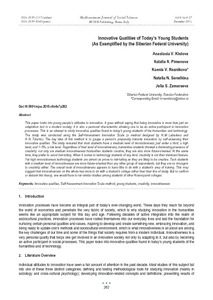Innovative qualities of today's young students (as exemplified by the Siberian Federal University)
Скачать файл:
URI (для ссылок/цитирований):
https://elib.sfu-kras.ru/handle/2311/27851Автор:
Kistova, A. V.
Pimenova, N. N.
Reznikova, K. V.
Seredkina, N. N.
Zamaraeva, Ju. S.
Коллективный автор:
Гуманитарный институт
Кафедра культурологии
Дата:
2015-12Журнал:
Mediterranean Journal of Social SciencesКвартиль журнала в Scopus:
Q3Библиографическое описание:
Kistova, A. V. Innovative qualities of today's young students (as exemplified by the Siberian Federal University) [Текст] / A. V. Kistova, N. N. Pimenova, K. V. Reznikova, N. N. Seredkina, Ju. S. Zamaraeva // Mediterranean Journal of Social Sciences. — 2015. — 6 S7 (№ 6). — С. 262-268Аннотация:
This paper looks into young people’s attitudes to innovation. It goes without saying that being innovative is more than just an
adaptation tool in a modern society; it is also a personal characteristic allowing one to be an active participant in innovation
processes. This is an attempt to study innovative qualities found in today’s young students of the humanities and technology.
The study was conducted using the Self-Assessment Innovation Scale (a method designed by N. M. Lebedeva and
A. N. Tatarko). The key idea of this method is to gauge a person’s propensity towards innovation by self-assessing their
innovative qualities. The study revealed that most students have a medium level of innovativeness; just under a third, a high
level; and 1–5%, a low level. Regardless of their level of innovativeness, humanities students showed a dominating presence of
creativity: not only are medium innovativeness humanities students creative, they are also more future-oriented. At the same
time, they prefer to avoid risk-taking. When it comes to technology students of any kind, creativity is not their dominant feature.
Yet high innovativeness technology students are almost as prone to risk-taking as they are likely to be creative. Tech students
with a medium level of innovativeness are more future-oriented than any other group of respondents, but they are no strangers
to creativity either. The overall level of innovativeness appears to have little to do with a student’s area of training. This may
suggest that innovativeness on the whole has more to do with a student’s college rather than their line of study. But to confirm
or debunk this theory, one would have to run similar studies among students of other Krasnoyarsk colleges.
Коллекции:
Метаданные:
Показать полную информациюСвязанные материалы
Показаны похожие ресурсы по названию, автору или тематике.
-
The Model of Innovation Development Metasystem
Batukova Louise; Bagdasaryan Naira; Belyakova Galina; Vladimirova Olga; Belyakov Sergey (SOC ROMANA PENTRU ASIGURAREA CALITATII, BUCHAREST, 2019)Different fields of science from philosophy and institutional theory to theories of management, technological development and economics explore innovative transformations - mainly in terms of technical and institutional ... -
Ценности инновационной деятельности для студентов, экспертов и предпринимателей Красноярска: желаемый идеал, надежды и реальность
Москвич, Ю.Н.; Moskvich, Yury N.; Викторук, Е.Н.; Viktoruk, Elena N. (Сибирский федеральный университет. Siberian Federal University., 2011-11)The end of the 20th century has changed the world pattern dramatically. A new division of labor has appeared as well as the need for innovative growth of many branches of economy has intensified. All these changes have ... -
Формирование модели научно-технологической и инновационной политики в субъекте Российской Федерации
Бывшев, В. И.; Byvshev, Vladimir I. (Journal of Siberian Federal University. Сибирский федеральный университет, 2024-01)Переход передовых экономик к VI технологическому укладу, затянувшаяся череда глобальных политических и экономических кризисов, вызвавших беспрецедентное санкционное давление на Россию и ограничение ее к импорту высоких ... -
Innovation management as a system management tool in the modernization of the services sector
Marina, Vladimirovna Malakhovskaya; Aida, Talyatovna Petrova; Olga, Nikolaevna Vladimirova; Iradatalyatovna, Rustamova (2016-12)The formation of a new quality of services is mediated by the capacity forthe continuity of the innovation process. The need for innovation managementis caused by the blurring of the boundaries between marketing, organization, ... -
INNOVATION MANAGEMENT AS A SYSTEM MANAGEMENT TOOL IN THE MODERNIZATION OF THE SERVICES SECTOR
Malakhovskaya, M. V.; Petrova, A. T.; Vladimirova, O. N.; Rustamova, I. T. (2016-12)The article puts forward and verifies the hypothesis of the need for the end-to-end innovation for business development and the hypothesis of the coherence between the degree of individualization of technologies and products ...

